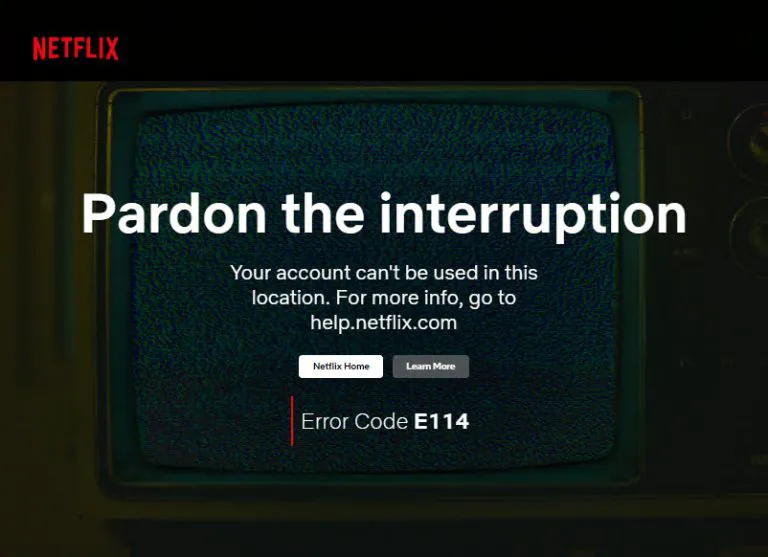Sources of Data: Where do people search sites get their data
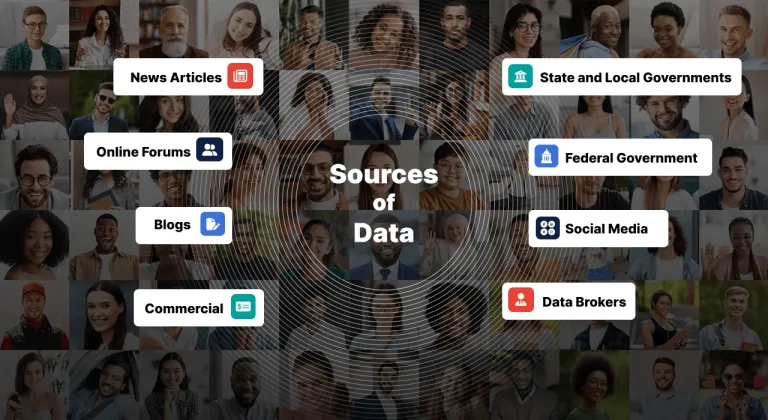
Have you ever considered what sort of information could be uncovered in your report on people search sites? These platforms, also known as people finder websites, deliver detailed reports to users based on minimal input, offering access to information on an individual, property, or vehicle. Some of the popular sites in this domain include BeenVerified, TruthFinder, Spokeo, PeekYou, Intelius, and Instant Checkmate.
But where does this data come from? If you’re curious about the origins of this information, you’re certainly not alone. In fact, as far back as 2012, this question had aroused heated discussions among forum users.[1]
In this post, we’ll explore the potential sources behind people search sites to shed light on their operations and provide you with a deeper understanding of how they function.
Table of contents
Why should you know about the data sources?
Before we dive into the data sources, you need to understand the importance of this knowledge.
Figuring out the origins of these data sources not only grants you insights into the limitations of relying solely on people search sites, but also equips you with the knowledge to navigate through the vast landscape of information available online.
Users of people search sites often encounter issues with inaccuracies or outdated information in the reports they receive. Understanding the underlying data sources can shed light on why such discrepancies occur.
Moreover, it’s not uncommon for some reports to contain extensive information while others offer very little or none at all. This disparity can be puzzling, but delving into the data sources can help unravel this mystery and provide clarity when conducting your own searches.
Now keep reading and follow us to unmask the data sources of people search sites.
Where do people search sites get their data?
When you utilize people search sites, you may gain access to reports that contain a plethora of information either for free or with a small fee. The data is collected from a variety of sources, which fall into three categories: (1) government sources; (2) other publicly available sources; and (3) commercial sources.
1. Federal, state, and local government public records
Public records are documents or pieces of information generated by government entities (federal, state, and local) that are not considered confidential in nature. These records pertain to the conduct and activities of the government and its agencies.[2]
The main reasons why public records are available to the public are:
1) Transparency and accountability – Providing access to government records allows citizens to scrutinize and evaluate how the government is functioning and making decisions that impact the public.
2) Right to know – The public has a fundamental “right to know” about the activities and recordkeeping of their government unless the information falls under specific exemptions.
The Freedom of Information Act (FOIA) is the key U.S. law that codifies the public’s right to access federal government records, while allowing certain exemptions to protect sensitive information. States also have their own “open records” laws governing public access to state/local government records.[3]
Below are some common types of public records that both people search sites and individuals may gain access to:
a. Federal Government:
- Demographic data:
The U.S. Census Bureau provides information about the demographics of all states and counties.
- Criminal records:
Agencies such as the Federal Bureau of Investigation (FBI) maintain databases of criminal records. Typically, it lists the “Most Wanted”, where the information includes the person’s aliases, DOB, occupation, photos, charges or allegations against the individual, properties or vehicles owned, as well as other details.

b. State and Local Governments:
- Marriage records:
Marriage certificates, as one of the vital records, are filed permanently in a State’s vital statistics or in a city, county, or other local office.[4] Some might offer online portals to access this information.
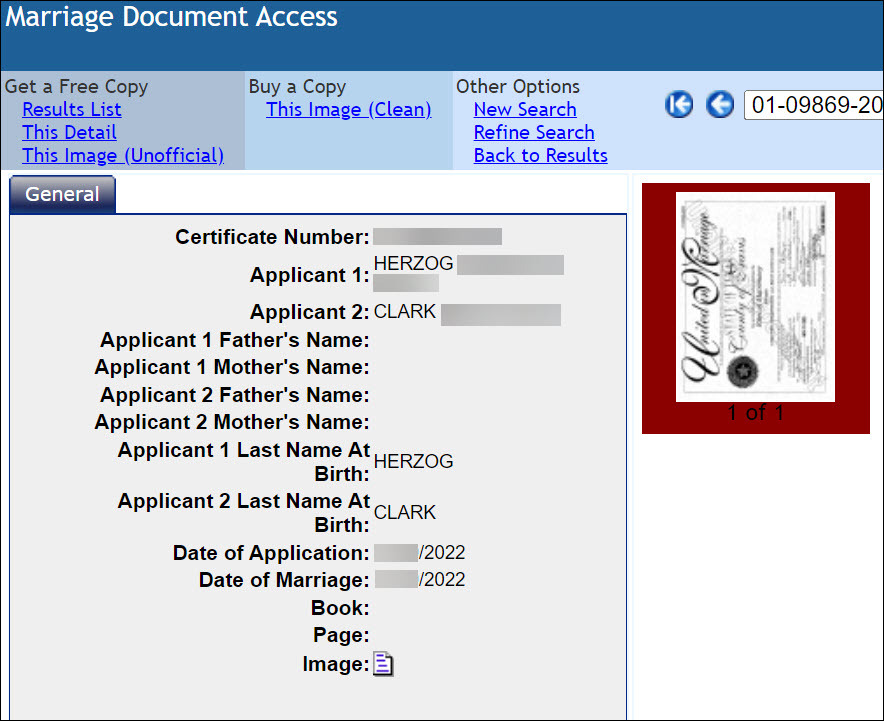
If you know the county in which the marriage occurred, enter the county name + marriage records search into the search bar of your browser, and check if there are any results. Or you can simply go to the website of the county clerk. Information usually includes the names of the applicants and the copies of the license.
However, it’s crucial to acknowledge that records availability is subject to certain restrictions. For instance, in California, couples possess the option to select a confidential marriage license, which permits them to keep their marriage records private and accessible solely to the couple, their legal representatives, or authorized government officials.[5]
- Property records:
State and local governments maintain property records that usually contain information about property owners, property addresses, parcel numbers, property dimensions, and assessed property values.
Although some might require you to access this information by visiting their office, most states or counties have online portals for users to conduct searches. You can use keywords such as the county name + assessor’s office or the county name + property appraiser.
Below are the websites to do a property search in Lee County, FL, and Alameda County, CA:
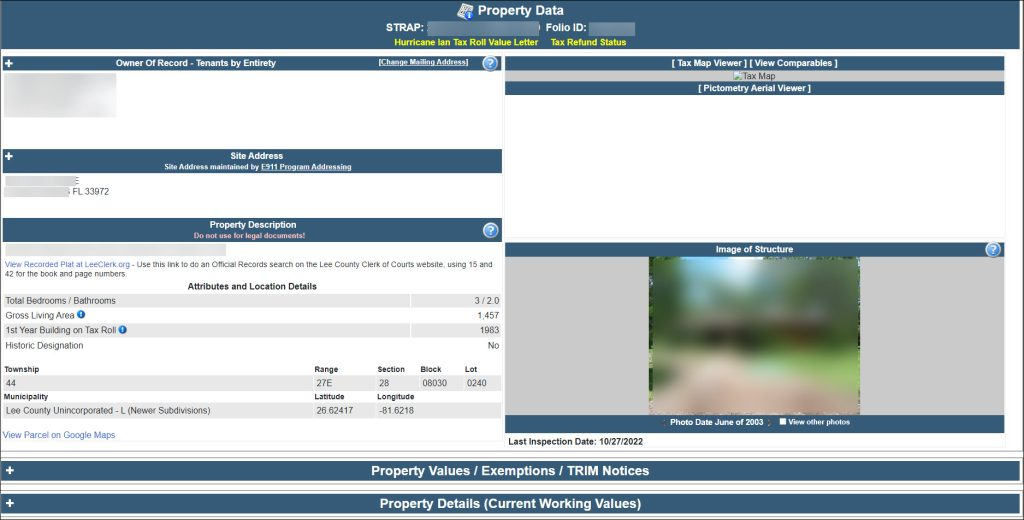
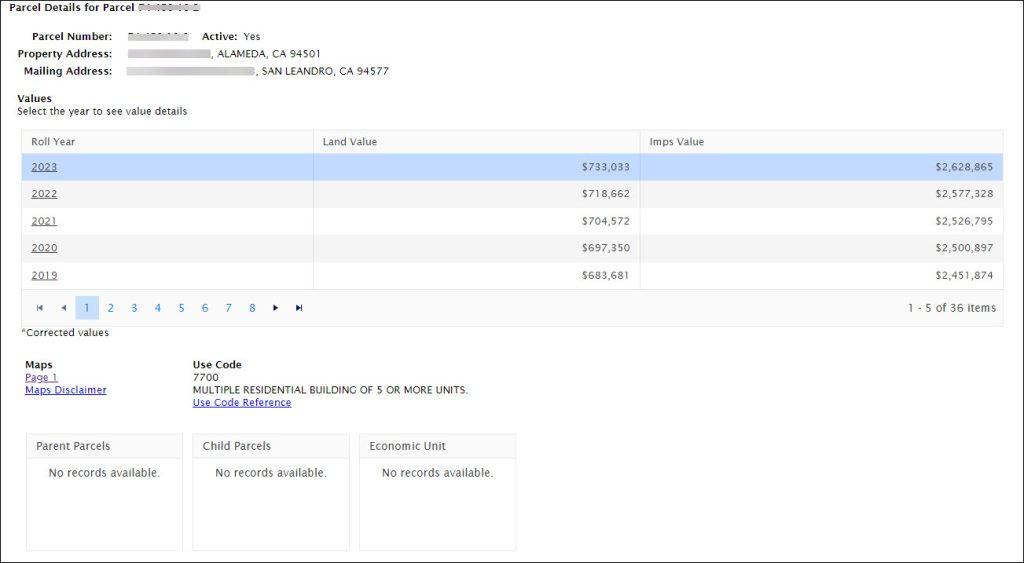
- Court records:
The state courts or county clerks usually maintain records of legal proceedings, including criminal cases, civil cases, and traffic citations. Available through the state’s or clerk’s online records portal, they may contain information on the defendant’s DOB and address, along with other details.
(Please be aware that the availability of a defendant’s personal information can vary by state or county. We recommend checking the respective state court or county clerk websites for the most current and accurate information. )
If you want to conduct searches on your own, things would be easier if you know the specific county. If you don’t know the county name of an address, Google it!
Here are two websites we’ve explored:
Broward County Clerk of Courts – Case Search
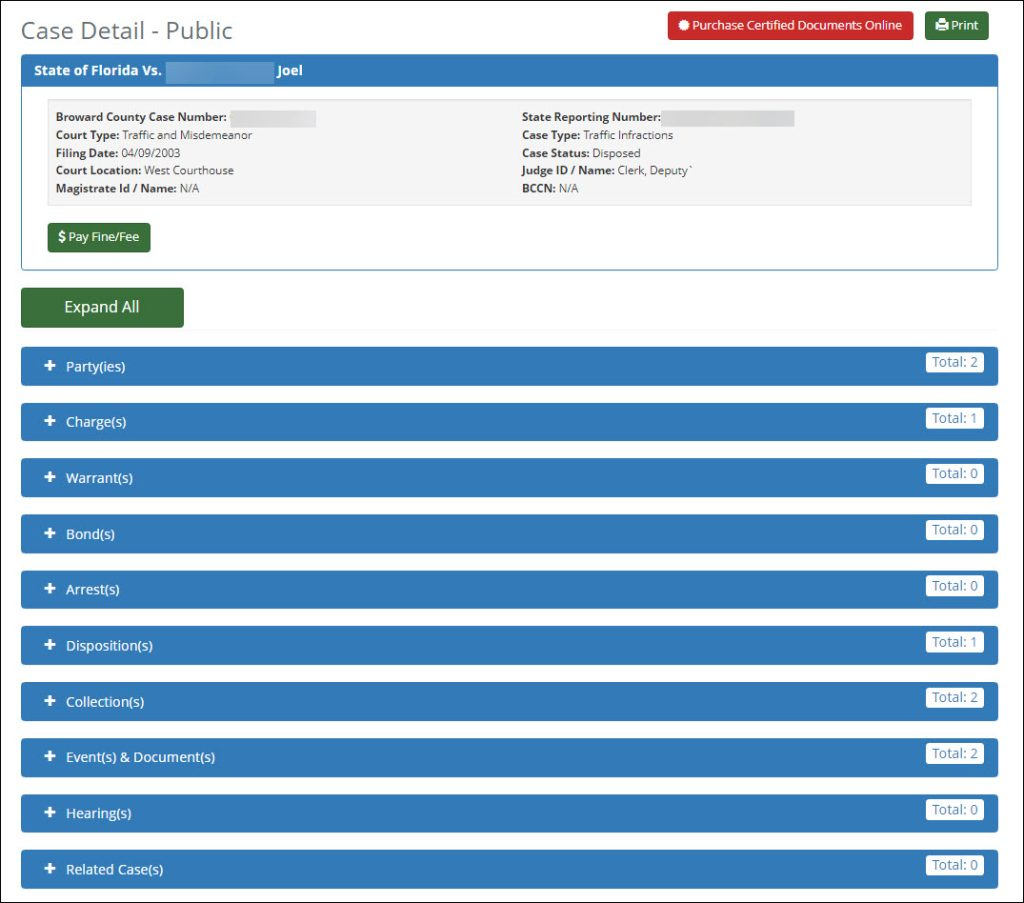
Dual County Clerk of the Circuit Court – Court Records Search
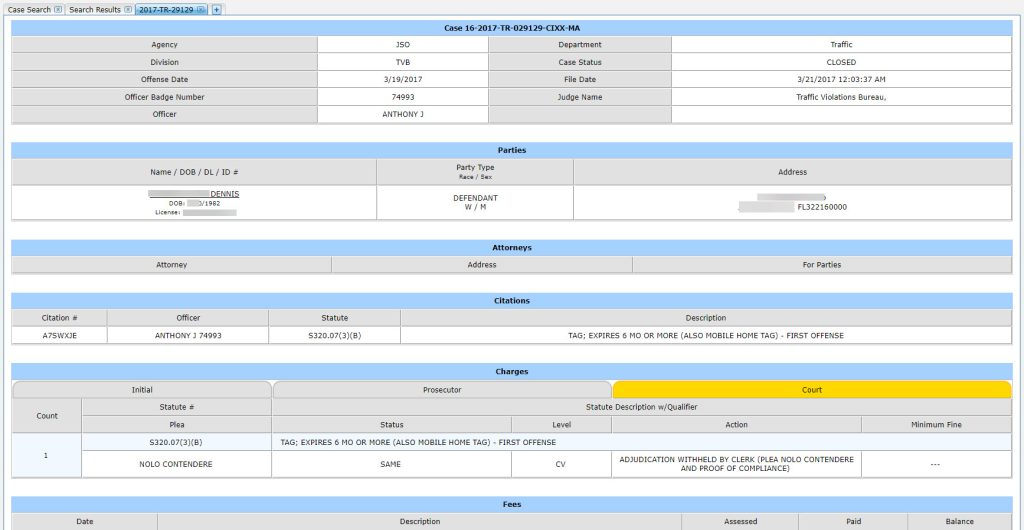
- Voter registration information:
State governments maintain voter registration databases that contain information about registered voters, including names, addresses, DOBs, and party affiliations. Access to this information may be restricted and subject to certain limitations.
When conducting a voter records lookup, you may need to know the specific state in which the person is registered to vote. Then locate the right website to look up the information by entering the state name + voter information lookup into the search bar of your browser. You may need to adjust the keywords depending on the results you can find every time you try.
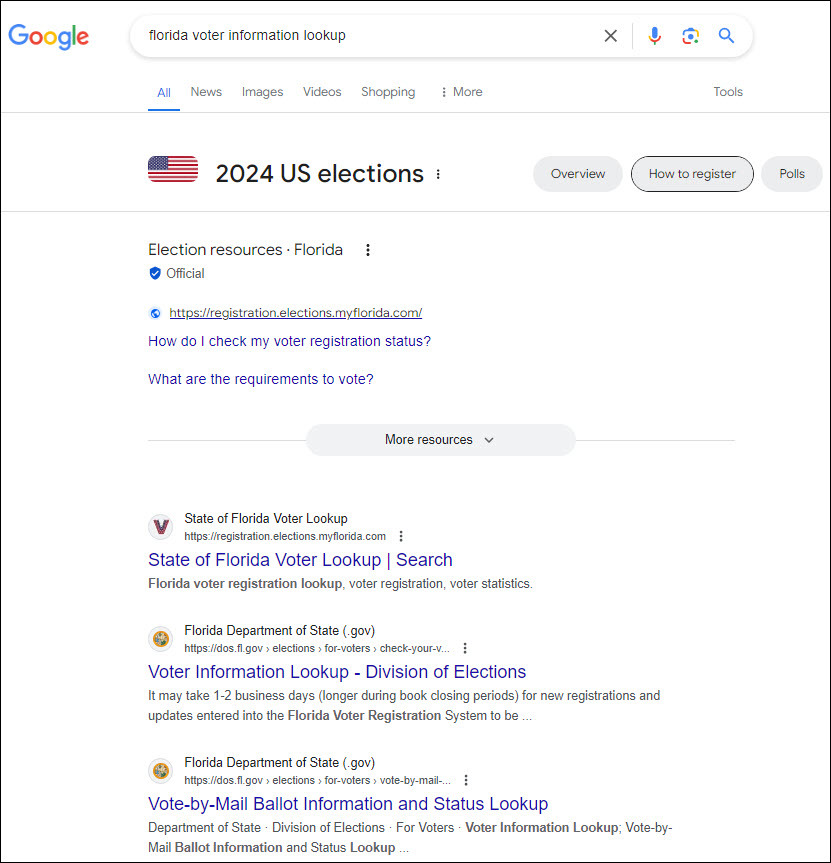
- Professional licenses:
State licensing boards maintain records of professional licenses issued to individuals in various professions, such as doctors, lawyers, and engineers.
Oftentimes, they allow the public to search using a name or license number. These records may include information about the license type, mail address, email address, and school name. Additionally, to check a lawyer’s information, you can click on the link provided for the specific state on this website: https://generalbar.com/State.aspx.
To search for an individual of other professions, you can use keywords the state name + license lookup and verification system.
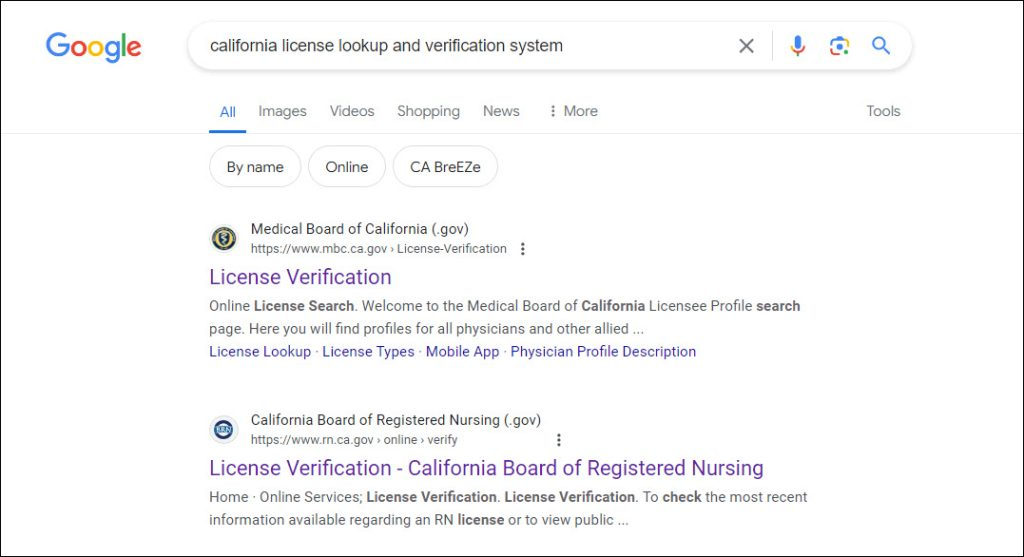
- Vehicle information
We successfully found information such as vehicle specifications, odometer readings, salvage history, recalls and accidents through the websites of National Highway Traffic Safety Administration (NHTSA) and the state’s Department of Motor Vehicle (DMV).
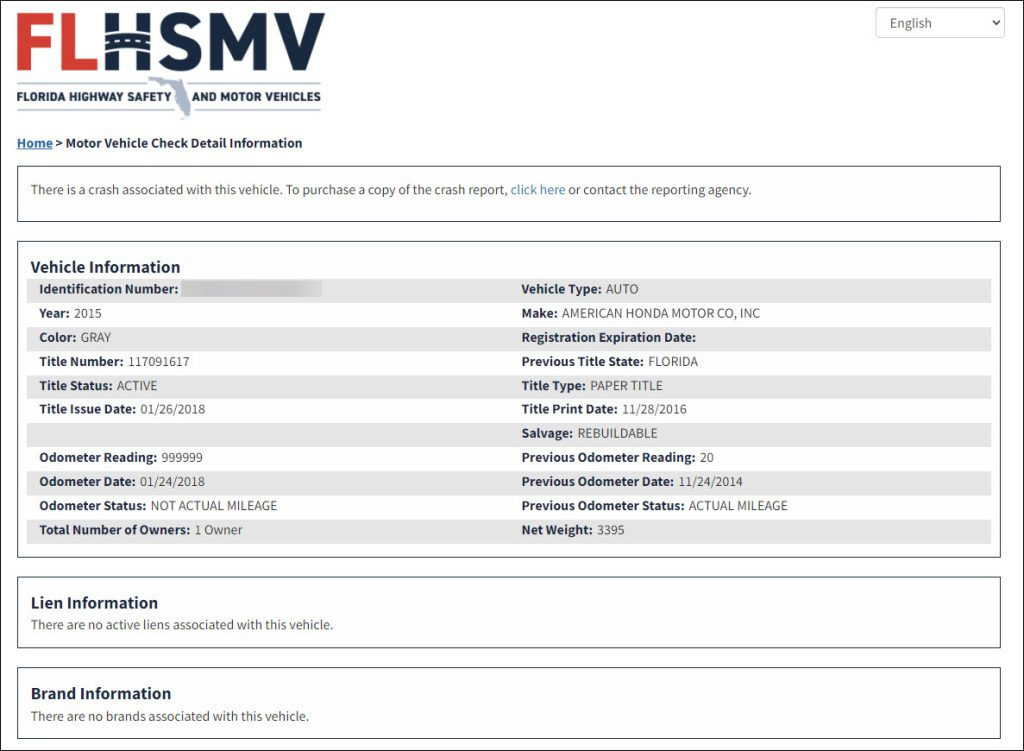
Nevertheless, it’s vital to understand that the Federal Driver’s Privacy Protection Act (DPPA) prohibits the disclosure of personal information (information that identifies an individual, including an individual’s photograph, social security number, driver identification number, name, address (but not the 5-digit zip code), telephone number, and medical or disability information) without the express consent of the person to whom such information applies.[6]
2. Publicly available sources, including social media, blogs, and the Internet
People search sites leverage publicly accessible platforms, such as social media networks, blogs, and online forums, to gather a wealth of information about individuals.
For instance, in the documents released by FTC, some data brokers crawl social media platforms like LinkedIn, where individuals often share personal details publicly. And people search sites are one of the products data brokers offer.[7]
Consider a scenario where an individual shares updates about their professional achievements on LinkedIn without adjusting their privacy settings. People search sites can capture this information and incorporate it into their reports.
Again we would like to take LinkedIn as an example. If a profile uploads a photo and doesn’t adjust any changes, namely, leaves it to the default “Choose who can see your profile photo – Anyone”, then their profile photo is publicly viewable. You can either search for this profile within the app or use keywords the name + site:linkedin.com, click on the Images tab of your web browser, then you can view their profile photo.
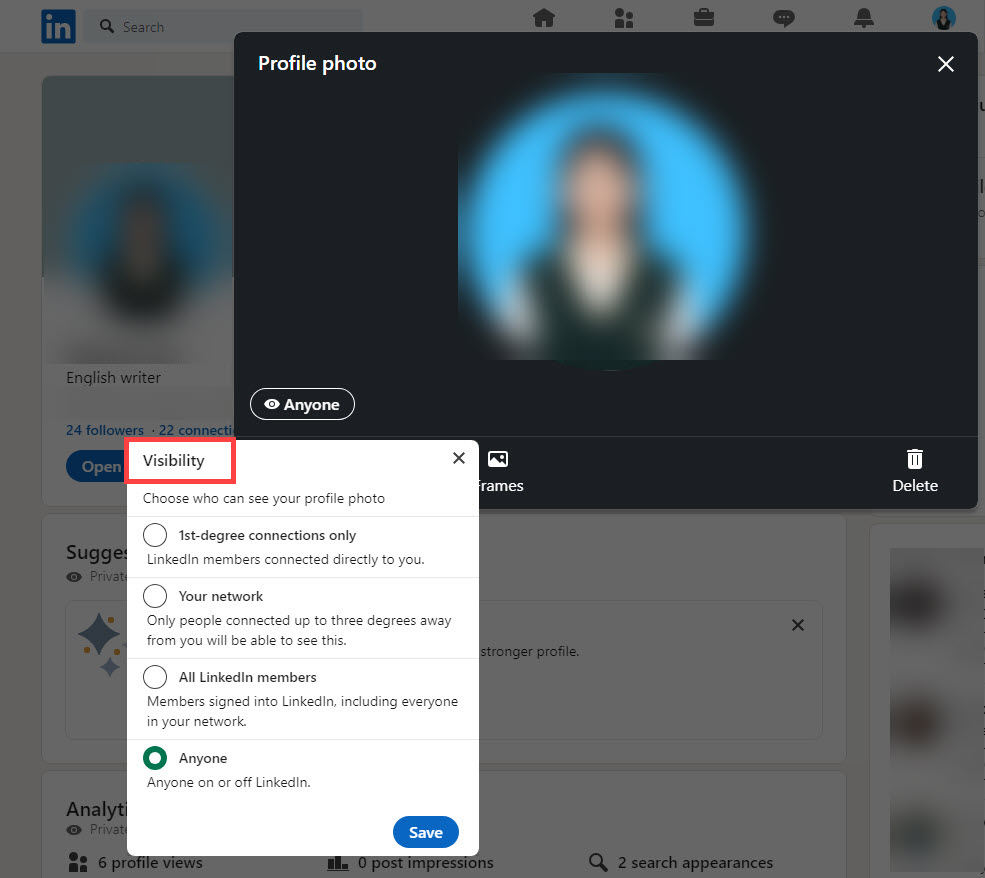
Sometimes they might include the email address, phone number, and address as their contact information and make it accessible to anyone.
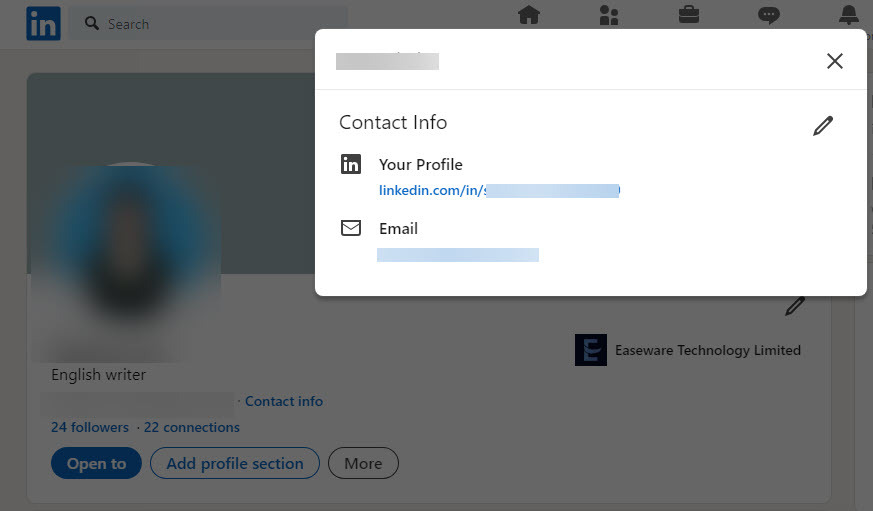
Similarly, blogs and online forums serve as platforms for individuals to express their thoughts, experiences, and interests publicly. Moreover, press reports and news articles contribute to the data pool accessible to people search sites. They may include an individual’s name, DOB, job title, photos, and more. By aggregating information from media sources, people search sites can compile profiles of individuals with more information.
As a trick to search for the information on your own, you can enter the search subject’s name or possible username, along with the quotation marks “” into the search bar and scroll through the results to sort out the useful information for you.
3. Commercial data sources
In addition to public records and publicly available sources, people search sites may purchase information from other data brokers, the companies that collect information from a wide range of sources. When searching within the people search sites for the disclosure of data sources, we cannot find any mentions of purchasing data.
Check here:
- Where does TruthFinder get their information?
- Where does Spokeo get its data?
- How did Intelius get my information? Does Intelius collect my information?
- BeenVerified’s Data & Public Records
However, the documents released by FTC unveil the mystery behind the data sources of data brokers, among which are the commercial sources.[8]
In addition, when doing research, we found that Rapleaf, which was a US-based marketing data and software company and was acquired by email data provider TowerData in 2013, had been crawling and collecting consumers’ information including names, gender, location, colleges and universities attended, and occupations and sold it to other companies. After facing backlash, Rapleaf claimed to have deleted much of its crawled data, but companies that purchased the data were not required to delete it.[9] This suggests that people search sites may acquire data from commercial brokers who aggregate information across many sources.
What kind of data do they collect?
Despite various information and data sources available, people search sites don’t just collect all the data. In fact, nearly all people search sites claim that they don’t possess a database of information presented in the reports. Just as TruthFinder said, “A people search is an online tool that scans public records sources to compile information on an individual.”[10]
However, we can manage to know what kind of data people search sites are interested in, by analyzing data brokers. To be short, people search sites are a kind of data broker, among which the renowned ones are Experian, TransUnion, and Acxiom.
According to a report from FTC, much of the data collected by data brokers is demographics.[11] This may include consumers’ names, addresses, telephone numbers, gender, age, marital status, presence of and ages of children in household, education level, profession, income level, political affiliation, and information about their homes and other property.
In addition, they collect many other categories of information about individuals, such as purchase and transaction information, social media activity, and more.
Though people search sites and data brokers don’t collect exactly the same information, they share a significant amount of common data.
What information does a people search site provide?
After people search sites find their data sources and choose the information they want, they decide what to present to users.
When conducting a search on a people search site, you’ll receive reports on what you’re looking for. These reports are divided into various sections depending on whether you’re searching for a person, an address, or a vehicle. While the specifics may vary slightly across different platforms, there are some general sections that are commonly included in these reports.
Here is a list of data that may show up on an individual’s personal report:
- Name
- Birth information
- Phone numbers
- Email addresses
- Possible photos
- Current address
- Previous addresses
- Map showing person’s addresses
- Possible relatives
- Name of associates
- Education
- Jobs
- Social media profiles
- Assets
- Current & previous vehicles
- Criminal & traffic records
- Judgements & liens
- Voter registration history
- Financial records
- Licenses & permits
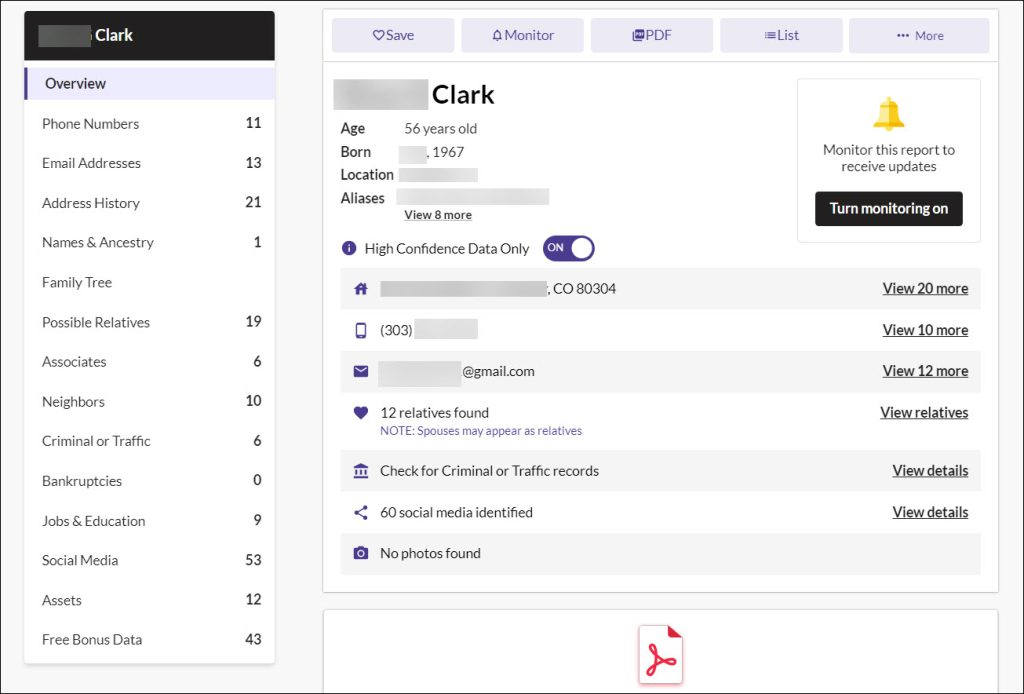
When searching for an address, the report contains:
- Construction date
- Lot & zoning details
- Property type
- Bedrooms, bathrooms, size & dimensions
- Estimated value & value history
- Property tax
- Possible owners
- Possible residents
- Neighborhood demographics
- Natural hazards
- Sex offenders nearby & photos
- Deeds & liens
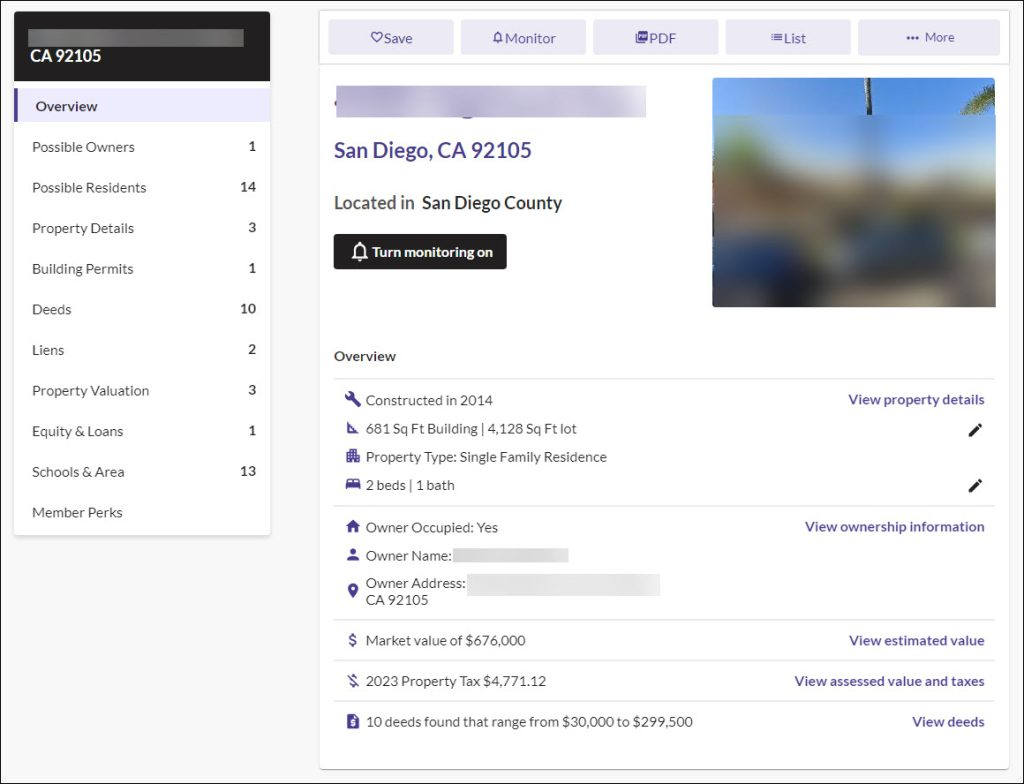
For a vehicle search, reports may include the following information:
- Vehicle photos
- Sale listings
- Accident history
- Salvage records
- Theft records
- Title records
- Recalls
- Market value
- Ownership cost
- Vehicle specs
- Warranties
- Vehicle safety
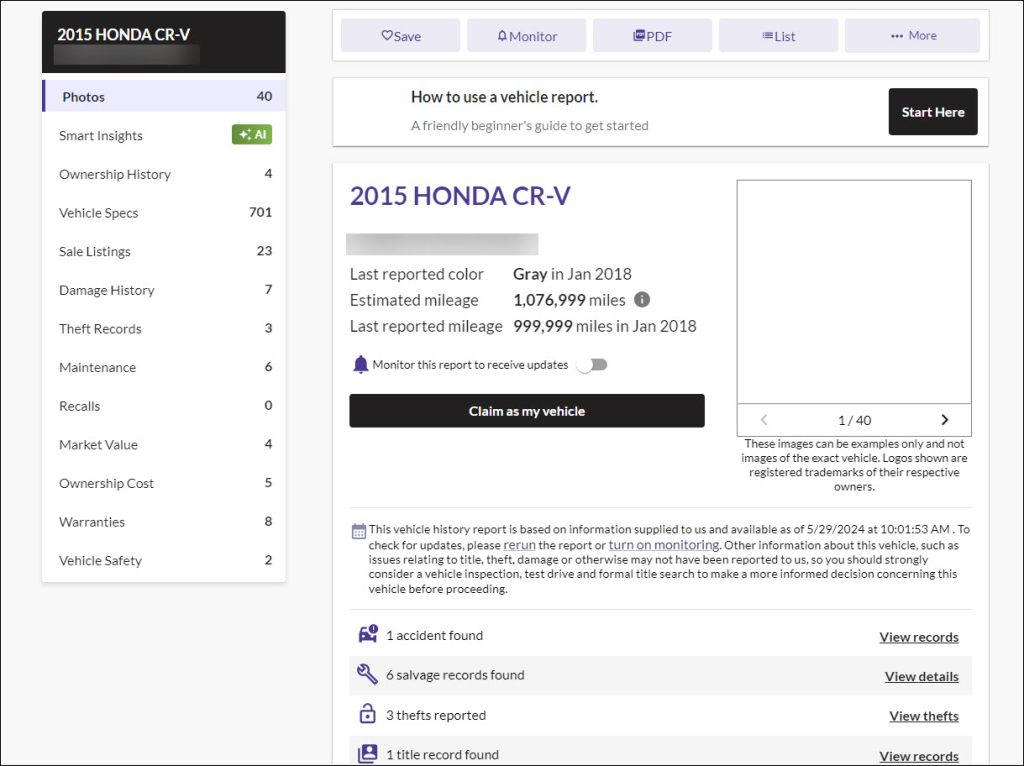
Please note that not all people search sites offer a vehicle search service (VIN lookup or license plate lookup), but sites like Bumper are also grouped as data broker products as people search sites.
However, are these reports totally reliable? No, check the below section to figure out their limitations.
What problems may people search reports have?
While people search reports offer a convenient means to access personal information, they are not without their drawbacks. FTC notes that these sites collect data from various sources, compile it into reports, and sell them to interested parties. However, it’s important to recognize the potential shortcomings associated with these reports.
One significant issue arises from the diverse range of sources utilized by people search sites, some of which may provide unverified or outdated information.
For instance, in a recent case, TruthFinder and Instant Checkmate faced a $5.8 million fine, in part due to claims of report accuracy that were deemed misleading by the FTC[12]. The commission highlighted that these sites obtain information from third parties that explicitly disclaim its accuracy, and yet, no steps are taken to verify its correctness.
During our research, we discovered that TruthFinder shows two LinkedIn profiles in a lady’s report, based on her maiden and married name. Both profile owners are nurses, but the photos, education, and employment experience show they’re certainly different people.
Furthermore, each website employs its own matching algorithms, leading to discrepancies in report accuracy and reliability.
In 2005, Intelius filed a patent application named Household Grouping Based on Public Records, illustrating how the company augments and groups records from various sources. For example, by applying at least one household grouping key to each of the augmented records resulting in a household grouping key value, Intelius displays the records with the same key value as a household grouping.
Similarly, PeekYou is the owner of another patent Distributed Personal Information Aggregator, which focuses on aggregating personal information available from public sources over a network.
Despite efforts to enhance reliability, discrepancies persist. One notable instance of such disparity was humorously highlighted by a Redditor who discovered that their brother’s dog was listed as a relative on Spokeo, a popular people search site, simply because they had created an online persona named Thor, followed by their surname.[13]
Moreover, there’s the challenge of information disparity between individual reports. If an individual has minimal online presence or has not engaged in activities that leave digital traces, their report may contain little to no information. This highlights the limitations of people search sites when it comes to individuals who actively maintain their privacy.
How do people search sites help?
Despite their flaws, people search sites can indeed be invaluable tools for various reasons.
To begin with, they offer a time-saving and efficient means of accessing information.
Just take marriage records as an example. When you’re looking for someone’s marriage record, the required information is the individual’s name and state. With this, you may be redirected to state or county portals, which may ask you to sign up for an account, fill in a form, provide more details, and wait for a response.
If you’re performing this search in Texas, you’ll realize that “protected records can only be ordered by immediate family”. To understand the policy of each state can cost you more time. Additionally, filtering through numerous search results for individuals with common names can be tedious.
In contrast, people search sites provide quick access to reports containing relevant information, often including familial connections, within minutes.
Secondly, these sites can offer a more cost-effective option compared to accessing paid public records directly.
When we performed a search about a California house on the CA government portal, we found that $14.95 is needed to unveil the owner’s information for this single report. But if you turn to paid people search sites like Spokeo, you can unlock unlimited reports with a monthly plan at $19.95 or enjoy a 7-day trial for $0.95 (be cautious about the unpermitted charging issue which happens a lot!).
Last but not least, people search sites do really work, though they may not in the way you imagine 🙂
A large number of people use these tools to reconnect with someone whom they lost contact with. In a personal report, phone numbers are listed out – although we discovered that some of them don’t belong to the report’s owner, but to his/her relatives. But, if you really contact these phone number owners, you get a great chance of connecting with the person you’re looking for. After all, a relative’s help is better than nothing.
While people search sites have their limitations, knowing their data sources empowers users to make the most of their functionality. By cross-referencing information from reports with official sources, users can verify accuracy and delve deeper into specific details.
For instance, if a criminal record appears on someone’s report, check the address history to specify the state or county, and then locate the corresponding official sites. Then utilize the provided identifier (e.g. case number) to precisely conduct your own searches and confirm the accuracy and details of the information.
This approach empowers individuals to make informed decisions when utilizing information obtained from people search sites.
Conclusion
People search sites serve various purposes, from reconnecting with long-lost family or friends to verifying online dates and investigating a vehicle’s history to avoid fraud. Understanding the sources of data behind these platforms is essential for users evaluating their legitimacy and value.
In conclusion, people search sites aggregate information from federal, state, and local government records, publicly available sources, and commercial data brokers. Despite their extensive data collection, users may encounter limited information depending on an individual’s online presence and privacy settings, and certain data may be exempt from disclosure.
We hope this exploration into the sources of data for people search sites has provided clarity and insight. If you’re conducting your own searches but struggling to locate specific information about individuals, properties, or vehicles, don’t hesitate to reach out to us in the comments below. We’re here to assist!
References:
- mathematics.26084. (2012, January 21). people search / information databases? ALL ABOUT CIRCUTS. https://forum.allaboutcircuits.com/threads/people-search-information-databases.65024/↩
- Public records. (2005, August 25). In Wikipedia. https://en.wikipedia.org/wiki/Public_records↩
- Freedom of Information Act (United States). (2004, April 11). In Wikipedia. https://en.wikipedia.org/wiki/Freedom_of_Information_Act_(United_States)↩
- National Center for Health Statistics. Application Guidelines. https://www.cdc.gov/nchs/w2w/guidelines.htm↩
- Types of Marriage Licenses. California Department of Public Health. https://www.cdph.ca.gov/Programs/CHSI/Pages/Types-of-Marriage-Licenses-.aspx↩
- Electronic Privacy Information Center. The Drivers Privacy Protection Act (DPPA) and the Privacy of Your State Motor Vehicle Record. https://epic.org/dppa/↩
- Federal Trade Commission. (2014). Data Brokers: A Call for Transparency and Accountability. https://www.ftc.gov/system/files/documents/reports/data-brokers-call-transparency-accountability-report-federal-trade-commission-may-2014/140527databrokerreport.pdf↩
- Federal Trade Commission. (2014). Data Brokers: A Call for Transparency and Accountability. https://www.ftc.gov/system/files/documents/reports/data-brokers-call-transparency-accountability-report-federal-trade-commission-may-2014/140527databrokerreport.pdf↩
- Office of Oversight and Investigations Majority Staff. (2013). A Review of the Data Broker Industry: Collection, Use, and Sale of Consumer Data for Marketing Purposes. http://educationnewyork.com/files/rockefeller_databroker.pdf↩
- TruthFinder. What is People Search? https://www.truthfinder.com/people-search/#:~:text=a%20people%20search%20is%20an%20online%20tool%20that%20scans%20public%20records%20sources%20to%20compile%20information%20on%20an%20individual↩
- Federal Trade Commission. (2014). Data Brokers: A Call for Transparency and Accountability. https://www.ftc.gov/system/files/documents/reports/data-brokers-call-transparency-accountability-report-federal-trade-commission-may-2014/140527databrokerreport.pdf↩
- Federal Trade Commission. (2023). FTC Says TruthFinder, Instant Checkmate Deceived Users About Background Report Accuracy, Violated FCRA While Marketing Reports for Employee and Tenant Screening. https://www.ftc.gov/news-events/news/press-releases/2023/09/ftc-says-truthfinder-instant-checkmate-deceived-users-about-background-report-accuracy-violated-fcra↩↩
- r/privacy. [liveoakgrove]. (2022, July 12). How do data mining companies know who your relatives are? [Online forum post]. Reddit. https://www.reddit.com/r/privacy/comments/vx0tey/comment/ifuousr/?utm_source=share&utm_medium=web3x&utm_name=web3xcss&utm_term=1&utm_content=share_button/↩

 View all of Yuki Huang's posts.
View all of Yuki Huang's posts.


